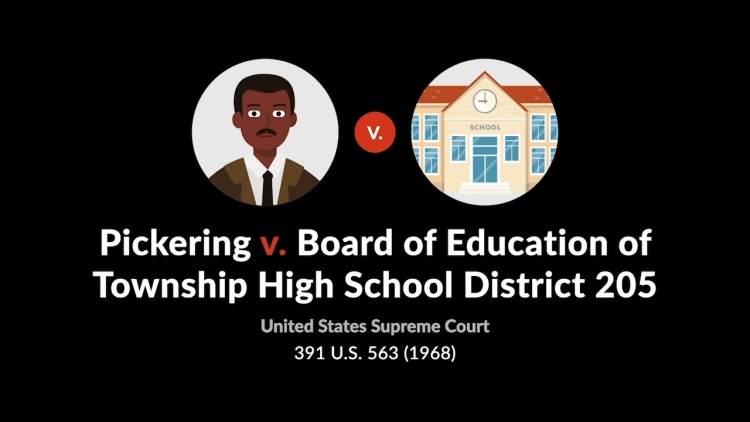Pickering v. Board of Education of Township High School District 205
United States Supreme Court
391 U.S. 563, 88 S. Ct. 1731, 20 L. Ed. 2d 811 (1968)

- Written by Josh Lee, JD
Facts
Marvin Pickering (plaintiff) was a teacher in Township High School District 205 (the school) in Illinois. Pickering wrote a letter to a local newspaper that was critical of the Illinois State Board of Education (board) (defendant) regarding a proposed tax increase. Pickering took issue with the board’s previous handling of a bond issue and the board’s allocation of financial resources between the educational and athletic programs. Pickering signed the letter in his own name and did not represent his views as the views of the school. The content of the letter was not directed at any person with whom Pickering would normally work in the course of his daily work. The board then terminated Pickering for writing and publishing the letter. The board held a hearing on the termination and determined that the letter contained numerous false statements that unjustifiably questioned the motives, honesty, integrity, truthfulness, responsibility, and competence of the board and the school administration. The trial court ruled in favor of the board. Pickering appealed, and the Illinois Supreme Court affirmed. The United States Supreme Court granted Pickering’s petition for certiorari.
Rule of Law
Issue
Holding and Reasoning (Marshall, J.)
What to do next…
Here's why 907,000 law students have relied on our case briefs:
- Written by law professors and practitioners, not other law students. 47,100 briefs, keyed to 996 casebooks. Top-notch customer support.
- The right amount of information, includes the facts, issues, rule of law, holding and reasoning, and any concurrences and dissents.
- Access in your classes, works on your mobile and tablet. Massive library of related video lessons and high quality multiple-choice questions.
- Easy to use, uniform format for every case brief. Written in plain English, not in legalese. Our briefs summarize and simplify; they don’t just repeat the court’s language.





